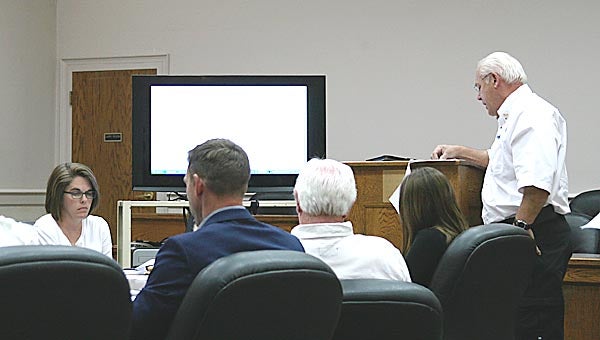Unpaid bills, write-offs factors in squad’s financial woes, CCRS Director says
Published 12:02 am Tuesday, May 5, 2015

Star Photo/Abby Morris-Frye
Carter County Rescue Squad Director Terry Arnold, at right, presents his agency’s budget request to the Carter County budget committee Monday night. The Rescue Squad has requested $387,000 in additional funding from the county this year.
Members of the Carter County budget committee heard several requests for additional funding during the first budget workshop of the season, including an impassioned plea from the Carter County Rescue Squad to help keep the agency alive and locally controlled.
Monday night’s workshop session dealt with funding requests from outside agencies. During workshop sessions, committee members can hear presentations and ask questions but they cannot make any motions or take any votes.
This year, the total amount of increases for funding requested by the outside agencies was $472,715.73 above what was funded in the 2014-2015 budget. The majority of that – a total of $387,000 – was requested by the Carter County Rescue Squad.
For the 2014-15 fiscal year, the county gave $170,000 in funding to the Rescue Squad. This year the agency is asking for $557,000 from the county. The agency also requested additional funding from the City of Elizabethton.
While the rescue operations portion of the agency’s request remains the same this year, CCRS Director Terry Arnold said the additional money asked for will serve to reinstate seven employees and offset the increased cost of indigent patient care.
“The Affordable Care Act has reduced our revenues and the bad debt write-off amounts continue to increase,” Arnold said.
There are two types of “write-offs” affecting the Rescue Squad’s revenue, Arnold said – contractual write-offs, which are set by the insurance companies, and bad debt write-offs, which happen when patients do not pay their bills.
For the 2013-14 fiscal year, the Rescue Squad had $631,731.05 in bad debt write-offs. For this fiscal year those numbers have more than tripled with nearly two full months left in the fiscal year. From July 2014 through April 2015, the agency has seen $1,929,529.65 in bad debt write-offs.
“We have $307,000 right now in collections,” Arnold said. “If we get 10 percent of that we will be lucky.” So far this fiscal year, the agency has sent $145,000 in overdue accounts to collections, he added.
Arnold blamed the higher deductibles and out-of-pocket expenses with insurance plans under the Affordable Care Act as one of the main factors patients are not able to pay their Rescue Squad bills.
“Where people used to have a $1,000 deductible, now they have a $5,000 deductible and they just aren’t able to pay it,” he said.
However, these dire financial straits did not happen overnight, Arnold said. “This has happened over 10 years or more,” he said.
During that time, the agency’s revenues have decreased as Medicare payments were cut and the city and county governments made cuts to meet their own budgets. Despite decreased revenues, the calls for service increased, as did state and federal requirements for equipment and training.
To help the agency survive, several expenses were cut to try to save money.
“We’ve cut staff, we’ve cut training and we’ve cut trucks on the road,” Arnold said. “That has the potential to hurt our times getting to people in need.”
The Rescue Squad once had 53 employees, but now there are only 31. Excess equipment has also been sold in an attempt to keep operating, Arnold said.
Fewer trucks on the road means each crew must answer more calls. Many times, those calls come back-to-back with no break, Arnold said.
“We are pushed to the limit now,” he said. “The people used to be able to go to the station and get some sleep for a little bit but now a lot of times they are going for 24 hours.”
Several committee members had questions regarding the agency’s funding, billing and operation practices.
“I think our Rescue Squad is very important and needed, but I also think this is a lot of money this county doesn’t have,” Commissioner Nancy Brown said. She said she would like to have the County Technical Assistance Service come in and “do some oversight.”
Because the meeting was a workshop session, no motions could be made Committee Chairwoman Sonja Culler said, but added she would contact CTAS regarding the matter.
In addition to the request for an increase in funding presented by the Rescue Squad, committee members also received requests for additional money from Carter County 911, the American Red Cross, Retired Senior Volunteer Program, the Elizabethton/Carter County Public Library, Elizabethton City Parks and Recreation Department, Carter County Soil Conservation, the Department of Agriculture, East Tennessee State University Pathology Services, Carter County Tomorrow, and Carter County Boys and Girls Club.
The following agencies requested the same amount of funding they received last year: the seven county Volunteer Fire Departments, Vocational Rehabilitation Services, Senior Citizens Club, First Tennessee Human Resource Agency, Imagination Library and First Tennessee Development District.
The county also received a request for funding from a new outside agency, the Dawn of Hope, who has requested $2,000 in funding from the county.




